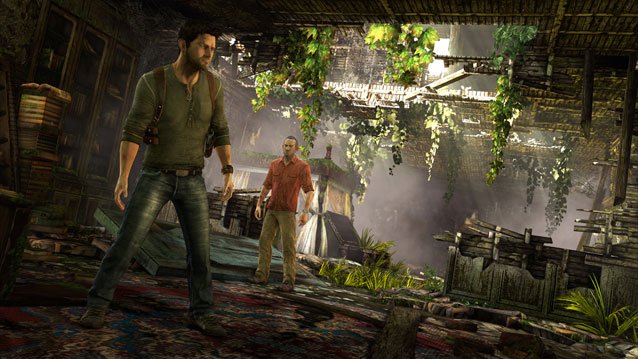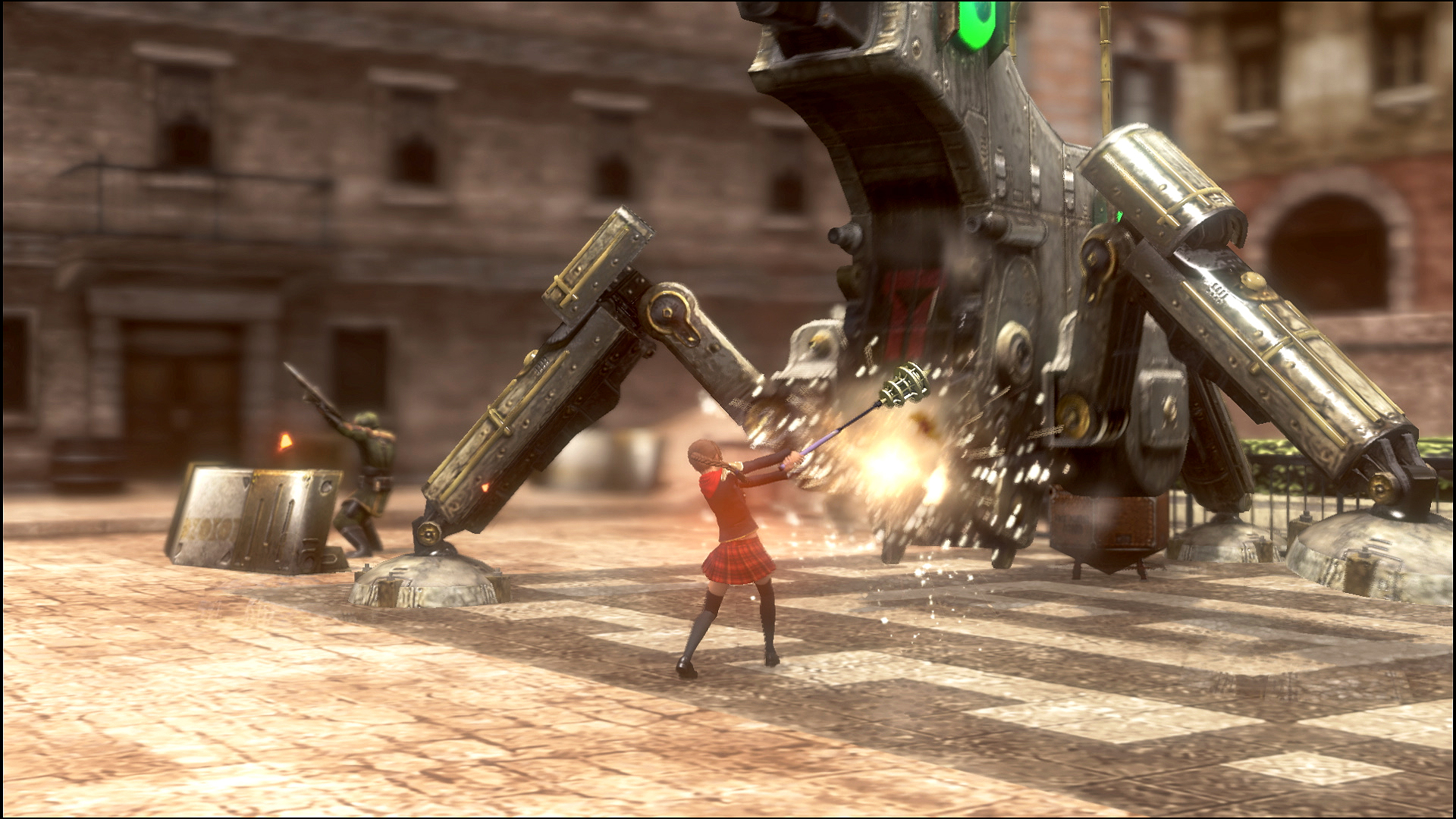

Game Rant’s Ryan Blanchard reviews From Dust
Video games as a medium allow users to escape into a fantasy world where the rules of reality don’t apply. They can transport gamers to far away locales, place them in the shoes of powerful heroes, or even allow them to play god. Few games in recent years have achieved the feeling of being an all-powerful entity as 2001’s Black & White and its 2005 sequel. Ubisoft‘s newest game though, From Dust, aims to bring back the satisfying feeling of being in control of the elements – and shaping the world to your liking.
While the idea of playing god is far from new in the realm of video games, From Dust presents a unique take on the concept, giving you almost complete control over the elements themselves. Your goal, in simplest terms, is to provide for the survival of a tribe that worships you – while enlightening them.
Even before you get the chance to begin manipulating the surrounding world, the game’s beauty takes center stage. While there’s no denying that From Dust is a beautiful game, everything about the title’s presentation seems understated. Even though the designs of the tribesmen and the elements that make up the environment feel unique, they don’t draw attention to themselves. Everything in the world fits together and feels natural, which highlights one of the game’s biggest strengths.
There are few games that manage to create such a strong connection between the player and the world that they are manipulating. As the world naturally shifts and evolves under your touch, it’s hard not to be mesmerized. Grass, trees and other foliage are constantly spreading out from the tribe’s villages, bringing nature back to the world as animals return to the land. Watching the world develop can be an awe-inspiring sight and one that is truly unique in the current gaming landscape.
From Dust‘s sounds are equally impressive – and equally low-key. Most times, players will barely even notice that there is music in the background. Like the graphics, the music fits-in with everything else in the game naturally. Moving closer to a tribe’s village, the faint sound of drums gets louder – producing a tribal beat. In the game’s world, the sounds of nature add to the experience as waves crash and grass blows in the wind. Everything comes together to provide the gamer with a feeling of serenity – reminiscent of the PSN game Flower.
Turning to the gameplay, while From Dust presents itself in part as a god-game, it feels more like a puzzle game – one that makes use of god-game elements. In each successive world, players are tasked with guiding the tribe through the landscape, erecting villages at each of the totems scattered about the land. Only then can they move onto the next world to explore.
In order to guide the tribe, players make use of the Breath. The Breath allows you to gather together the elements that make-up the world – before placing them elsewhere throughout the landscape. Elements can range from soil (which allows nature to expand throughout the world), to water (which provides life and washes away soil if the current is too strong), to lava (which solidifies and creates natural rock barriers).
The physics that control the elements are truly impressive. As water flows down the side of a rock, if there is soil in its way, it will begin to wash down the surface, and gather at the bottom. While soil can be piled-up to create a barrier (blocking the flowing water), it doesn’t take long before the water pooling up inside the makeshift dam begins running over the top of the soil, slowly washing the barrier away. As the elements react with the world, they continue to feed into the flowing connectivity created by all the other elements of the game.
In order to aid the tribe’s survival, players can also make use of special abilities that are unlocked – as you create villages around the world’s totems. The powers include the ability to turn all the water into jelly for a limited time (allowing players to literally part the seas) as well as douse any fires that may be threatening the villages, among others. All of these mechanics come together to create an engaging puzzle experience – manipulating the different elements as players forge a path for their tribe.
However, the tribe cannot be directly controlled – which highlights one of the game’s issues. The path-finding of the tribe can sometimes lead to unwarranted failure as they travel into harm’s way without a second thought. While for some this will be more of an annoyance than anything, for others, this may enhance the puzzle-solving challenge. As players make their way through the game – you can can aid the tribes-people as they learn about the world around them. Their poor judgement only helps to enhance this feeling, as you must anticipate their foolish choices. Whether or not this was intended, some gamers are sure to enjoy the value their naivety adds.
While the puzzle-solving is rewarding, successfully guiding the tribe through a particularly treacherous path, the game’s controls are sometimes sluggish and lack precision. This can make dashing across the world, in order to save a burning village, difficult. The lack of precision would have been forgivable if the cursor was able to move faster, and while the pace feeds into the game’s serene sensation, at times it can be extremely frustrating.
In addition to the aforementioned story mode which makes up the brunt of From Dust, gamers are also able to take-on 30 short challenges – that each focus on one of the game’s core mechanics. While these can be completed rather quickly, they still present a sense of accomplishment – a welcome addition after completing From Dust‘s 7 hour story mode.
Players also have the option of going back to each of the game’s levels – in order to manipulate them as they please. While some of the later levels are quite large, it’s still disappointing that a true sandbox mode was not included. For a game that has such a strong physics engine behind it as well as gameplay and a presentation that are conducive to a relaxing creation mode, it’s odd that no sandbox mode was added to the package.
Despite the minor gripes, From Dust is a unique title in today’s gaming landscape. Following the release of Bastion (check out our review) for this year’s Xbox Live Summer Of Arcade promotion, From Dust has proven itself to be a strong and unique title – that can surely hold its own against other top-notch downloadable games being released.
Still undecided? For more details on From Dust check out our E3 preview and hands-on impressions.
From Dust is out now on the Xbox Live Arcade for 1200 MS Points and, as recently revealed, the PC. It will also see a release on the PlayStation Network later this year.
Let us know what you thought about the game in the comments.




 Final Fantasy Type-0 HD - Reach Level 99 in less than 30 minutes using Secret Training
Final Fantasy Type-0 HD - Reach Level 99 in less than 30 minutes using Secret Training How to Avoid Boredom by Adding Fun to Your Indoor Workouts
How to Avoid Boredom by Adding Fun to Your Indoor Workouts How to Unlock Wormhole Fulton Extraction Device in MGS V: The Phantom Pain
How to Unlock Wormhole Fulton Extraction Device in MGS V: The Phantom Pain NXNE: confirms 25 Bands for 2015 Lineup
NXNE: confirms 25 Bands for 2015 Lineup Dead Space 3 Walkthrough
Dead Space 3 Walkthrough